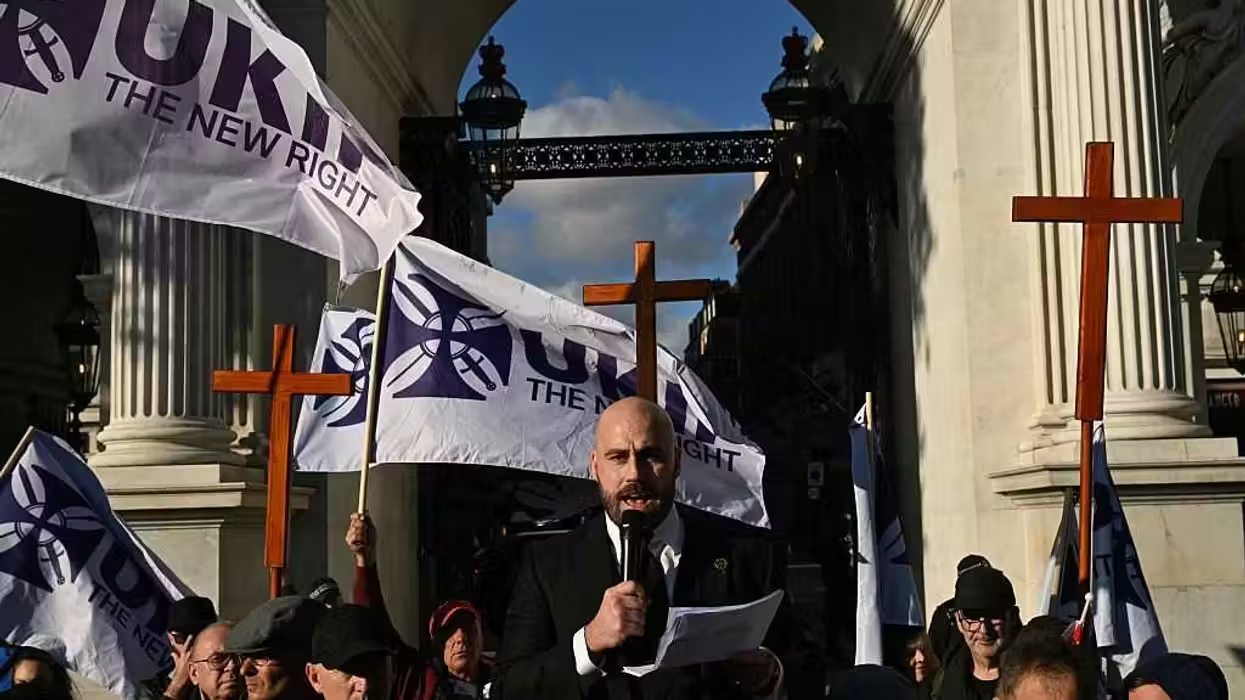
© 2026 Blaze Media LLC. All rights reserved.
Nearly two centuries ago a Georgetown lawyer named Francis Scott Key stood on the deck of a ship anchored in the Patapsco River and watched the British army and navy attack Baltimore. It was just weeks after this same army had sacked Washington, and torched the Capitol and White House in the third year of what we now call the War of 1812… so there was reason for worry. As the sun rose the next morning, Key saw through the fading mist that the giant flag – sewn by Mary Pickersgill and purchased to flaunt our resistance to Britain – still flew over Fort McHenry. The British forces were stopped at the fort, and withdrew, so Key did what was common for Americans of the time: he sat down and wrote a poem about it.
Pacing its cadence to follow the rhythms of a popular song called Anacreon in Heaven, he began with the memorable words: Oh, say can you see by the dawn’s early light… The rest is history, as they say, but this history is mostly forgotten by most of our people.
It wasn’t always so, and for much of our past the war was held in a special realm of esteem and affection by generations of our ancestors. At the 1912 meeting of the American Historical Association, Charles Francis Adams -- its past president and great grandson of John Adams -- gave the keynote address on the topic of whether we were a “world power” and, if so, when did we become one. It was his intention…
to specify the exact day of the year and month and week, the hour and almost the minute at which the United States blazed as an indisputable world power on the astonished, and, for some time yet, incredulous nations. To be specific, it was at thirty minutes after six o’clock of the afternoon of Wednesday, August 19, 1812. On that day and at that hour, just twenty weeks over a hundred years ago, this country, I confidently submit, became a nationality to be reckoned with; and such it has ever since been.
His audience, and every school child in America, knew exactly what happened that day: the American frigate Constitution shattered and sunk the British frigate Guerriere in the first major sea battle of the War of 1812.
That victory sent shock waves through both nations. Americans were stunned by an early victory in a war pitting our 16 warships against their 500 or more. The British too were stunned. As the Times observed:
It is not merely that an English frigate has been taken… but that it has been taken by a new enemy, an enemy unaccustomed to such triumphs, and likely to be rendered insolent and confident by them… Never before in the history of the world did an English frigate strike to an American.
And so began an unusual war that engaged the two nations in a conflict where both claimed victory when the peace treaty was signed, on Christmas Eve, two and a half years later.
Unlike most wars where conflicts over land or belief bring people to a state of mass violence, the war for us was about honor and the rule of law. But for the British, the war was a small part of their great war for national survival against a Napoleon-controlled Europe eager to conquer them. And the money and men needed to hold him off strained their resources.
And here lies the friction. By now America had become a great and prosperous trading nation, and as a neutral party, it profited handsomely by shipping raw materials to both sides to feed their war machines. And as a consequence of this, its busy merchant fleet, and small navy, offered steady work and good pay to sailors from every land, many of whom came from Britain and Ireland. Most were looking for work in a new land, and became U.S. citizens, while, some were deserters from the harsh conditions aboard British warships.
For Britain, this cross-border mobility left its vast navy perpetually short of crew, forcing it to abduct able-bodied men in British ports with press gangs. When that fell short, it seized sailors from foreign ships at sea in a process called impressment. Technically, impressment was to be used only against British citizens (and deserters) working on foreign vessels, but in an age without photo ID this was a hit or miss proposition, and accent, facial recognition and the desperation of British naval officers determined a seaman’s fate.
An estimated 6,000 American sailors were taken from ships and forced into service aboard British warships. The HMS Leopard’s unprovoked attack in 1807 on the USS Chesapeake to seize four deserters (three of whom were American), took the two nations to the brink of war.
While impressment was intended to bolster Britain’s labor pool, a series of official initiatives -- called Orders-in-Council -- were invoked to discourage Americans from trading with France, and France responded with its own restrictions. Hundreds of U.S. vessels were seized in the process, impinging our economic freedom and prosperity. America’s warships would later respond to these provocations by flying pennants and sails emblazoned with Free Trade and Sailors Rights.
British infringements were not confined to the sea, but also on the frontier where American settlers came in conflict with Indian tribes supported with money and arms by the British. Britain saw our western expansion as a threat to its prosperous fur trade in our land, and the security of its Canadian colony. Congressman Henry Clay spoke for many on the frontier when he claimed: “Is it nothing to us to extinguish the torch that lights up savage warfare? Is it nothing to acquire the entire fur trade connected with that country…”
By June 1812, enough was enough and President James Madison submitted to Congress the nation’s first Declaration of War. It passed with close margins: 19 to 13 in Senate, 79 to 49 in House. Opposition was from the Northeast where the shipping industry was concentrated: British trade regulations were just a cost of doing business, and an impressed sailor was just an employee who needn’t be paid at the end of the voyage.
And so began a war that only a narrow majority of the people supported against an opponent of such overwhelming military superiority to suggest our leadership suffered from flights of delusion. But in the process, and despite the ups and downs of victory and loss, when it was all over, and even when nothing much changed in the treaty, the war soon became something special among Americans of all rank, and the specialness grew as decades went by.
The war also brought forth its own Greatest Generation. Six future Presidents served in it, and the Battle of the Thames alone (Ontario, 1813) led to one president, one vice president, three governors, three lieutenant governors, four senators, and twenty congressmen, says historian Don Hickey. War veterans Davy Crockett, Sam Houston, Stephen Austin and Jim Bowie would later become heroes of Texas independence.
Three decades later a young Herman Melville served aboard the frigate United States – Constitution’s sister ship -- and in White Jacket he wrote about the war’s vets still in service:
These are the fellows, who… carry about their persons bits of “Old Ironsides”, as [some] do the wood of the true cross… that it does your soul good to look at; -- hearty old members of the Old Guard; grim sea grenadiers… whose society some of the youngest midshipmen much affect; from whom they learn their best seamanship; and to whom they look up as veterans; if… they have any reverence in their souls.
Perhaps we too can stir our souls in this the war’s bicentennial year, and honor the young men and boys, black and white, who stood behind the guns and gave better than they got.
Ronald Utt is author of Ships of Oak, Guns of Iron: The War of 1812 and the Forging of the American Navy
Want to leave a tip?
We answer to you. Help keep our content free of advertisers and big tech censorship by leaving a tip today.
Want to join the conversation?
Already a subscriber?
more stories
Sign up for the Blaze newsletter
By signing up, you agree to our Privacy Policy and Terms of Use, and agree to receive content that may sometimes include advertisements. You may opt out at any time.
Related Content
© 2026 Blaze Media LLC. All rights reserved.
Get the stories that matter most delivered directly to your inbox.
By signing up, you agree to our Privacy Policy and Terms of Use, and agree to receive content that may sometimes include advertisements. You may opt out at any time.






